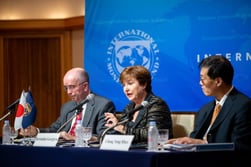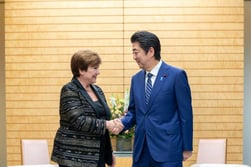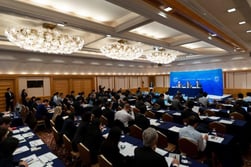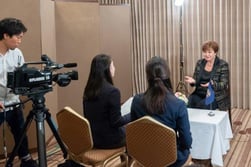News from Asia and the Pacific
Japanese Economy Solid, but Resilience to be Tested: Managing Director Concludes Annual Surveillance Visit
 Nov. 25, 2019, Tokyo, Japan –The Japanese economy has been solid and will remain resilient, but a synchronized global economic slowdown and Japan’s demographic challenges will test its resilience over time, said today IMF Managing Director Kristalina Georgieva before completing her first visit to Japan in her new capacity.
Nov. 25, 2019, Tokyo, Japan –The Japanese economy has been solid and will remain resilient, but a synchronized global economic slowdown and Japan’s demographic challenges will test its resilience over time, said today IMF Managing Director Kristalina Georgieva before completing her first visit to Japan in her new capacity.
Georgieva, who assumed the top position of the institution in October, flew to Tokyo to join the conclusion of the IMF’s annual economic surveillance visit, or Article IV mission, to Japan. Prior to her arrival, a team of IMF economists held consultative discussions for two weeks with various officials from the government as well as representatives of the private sector and think tanks to assess the economic situation, identify risks and provide policy advice to meet the challenges.
 During her stay, the Managing Director met with Prime Minister Shinzo Abe and held discussions with Deputy Prime Minister Taro Aso and Bank of Japan’s Governor Haruhiko Kuroda, among others.
During her stay, the Managing Director met with Prime Minister Shinzo Abe and held discussions with Deputy Prime Minister Taro Aso and Bank of Japan’s Governor Haruhiko Kuroda, among others.
“Japan’s recent economic performance has been solid, and its economy is expected to remain resilient,” said Georgieva at a press conference concluding this year’s mission, adding that Japan’s economy is expected to expand by 0.8 % in 2019 and 0.5 % in 2020 under current policies. She also noted that the October consumption tax increase has been implemented smoothly, largely due to the government’s countermeasures such as a reward program for cashless transactions.
 However, she said Japan’s resilience needs to be closely watched. “[It] will be tested most immediately by a synchronized global slowdown, and over the medium term by uncertainties in the world economy and by its own demographic trends,” she said.
However, she said Japan’s resilience needs to be closely watched. “[It] will be tested most immediately by a synchronized global slowdown, and over the medium term by uncertainties in the world economy and by its own demographic trends,” she said.
Japan’s demographic transition through rapid aging and shrinking of the population and the workforce poses heightened risks, potentially slowing Japan’s real growth. Georgieva said that structural reforms, particularly labor market reforms, are essential to address these demographic headwinds. Japan needs to consolidate gains from reforms that have led more women and the elderly to join the labor force. “What needs to happen next is more training and career opportunities for women to excel,” so that more female professionals are “in the high corridors of power,” she said.
 Asked by the media about the Fund’s advice on the consumption tax in the concluding statement, which recommends the tax rates be raised to 15 % by 2030 and 20 % by 2050, the Managing Director said that a “gradual further increase” of the tax can help Japan to achieve fiscal sustainability. “From the perspective of the Fund, and on the basis of what other countries have done, we think that over time there is more space – not immediately but over time – to rely more on consumption tax,” she replied.
Asked by the media about the Fund’s advice on the consumption tax in the concluding statement, which recommends the tax rates be raised to 15 % by 2030 and 20 % by 2050, the Managing Director said that a “gradual further increase” of the tax can help Japan to achieve fiscal sustainability. “From the perspective of the Fund, and on the basis of what other countries have done, we think that over time there is more space – not immediately but over time – to rely more on consumption tax,” she replied.
This was the first time Georgieva joined the conclusion of an economic surveillance visit to an IMF member country. A final surveillance report on Japan with policy recommendations will be prepared by the Japan team and issued in the coming months following review by the IMF Executive Board.
While in Japan, Georgieva not only held official meetings but also visited two sites to learn more about Japan.
 The first was the world’s largest underground water discharge channel in Saitama, the so-called ‘Underground Temple’, which has effectively controlled flood water and reduced damage from natural disasters, including the most recent Typhoon 19. Georgieva was keen to learn that the facility has prevented about US$1,350 million worth of damages ever since it started operating in 2006, while having cost US$2,350 million to build.
The first was the world’s largest underground water discharge channel in Saitama, the so-called ‘Underground Temple’, which has effectively controlled flood water and reduced damage from natural disasters, including the most recent Typhoon 19. Georgieva was keen to learn that the facility has prevented about US$1,350 million worth of damages ever since it started operating in 2006, while having cost US$2,350 million to build.
“The IMF advises its members how to use fiscal policies to become more resilient to more frequent devastating weather events,” she commented after a briefing at the site by officials of the Ministry of Land, Infrastructure, Transport and Tourism. “Japan is such a global leader in that sense. We need to learn from you and transmit this knowledge to other countries.”
 The Managing Director also visited a start-up company, MUJIN, in robotics automation in Tokyo to see and discuss how automation can help address Japan’s demographic issues and shrinking labor force.
The Managing Director also visited a start-up company, MUJIN, in robotics automation in Tokyo to see and discuss how automation can help address Japan’s demographic issues and shrinking labor force.
During her visit, she also spent some time with young officials from countries in Asia and the Pacific who are studying at Japanese graduate schools under the Japan-IMF Scholarship Program for Asia (JISPA). The program is one of the flagship activities of the IMF Regional Office for Asia and the Pacific in Tokyo and has nearly 740 alumni from 23 countries since 1993, many of whom now hold high positions in finance ministries and central banks in their own countries.
 At a townhall meeting with about 50 current JISPA scholars, Georgieva spoke of her views on global economic challenges and shared her career experience, starting out as a professor in an emerging market economy and recently transitioning to the top of an international organization, before taking selfies with them.
At a townhall meeting with about 50 current JISPA scholars, Georgieva spoke of her views on global economic challenges and shared her career experience, starting out as a professor in an emerging market economy and recently transitioning to the top of an international organization, before taking selfies with them.
“A program like this is tremendously important because it brings people from different countries, different cultures and different perspectives to learn together and to become citizens of the globe,” she told the young officials, adding that this learning could eventually reinforce the multilateralism for which the IMF advocates.
 Georgieva completed her official engagements in full swing, leaving a fresh impression with various audiences of the IMF from her leadership style.
Georgieva completed her official engagements in full swing, leaving a fresh impression with various audiences of the IMF from her leadership style.


